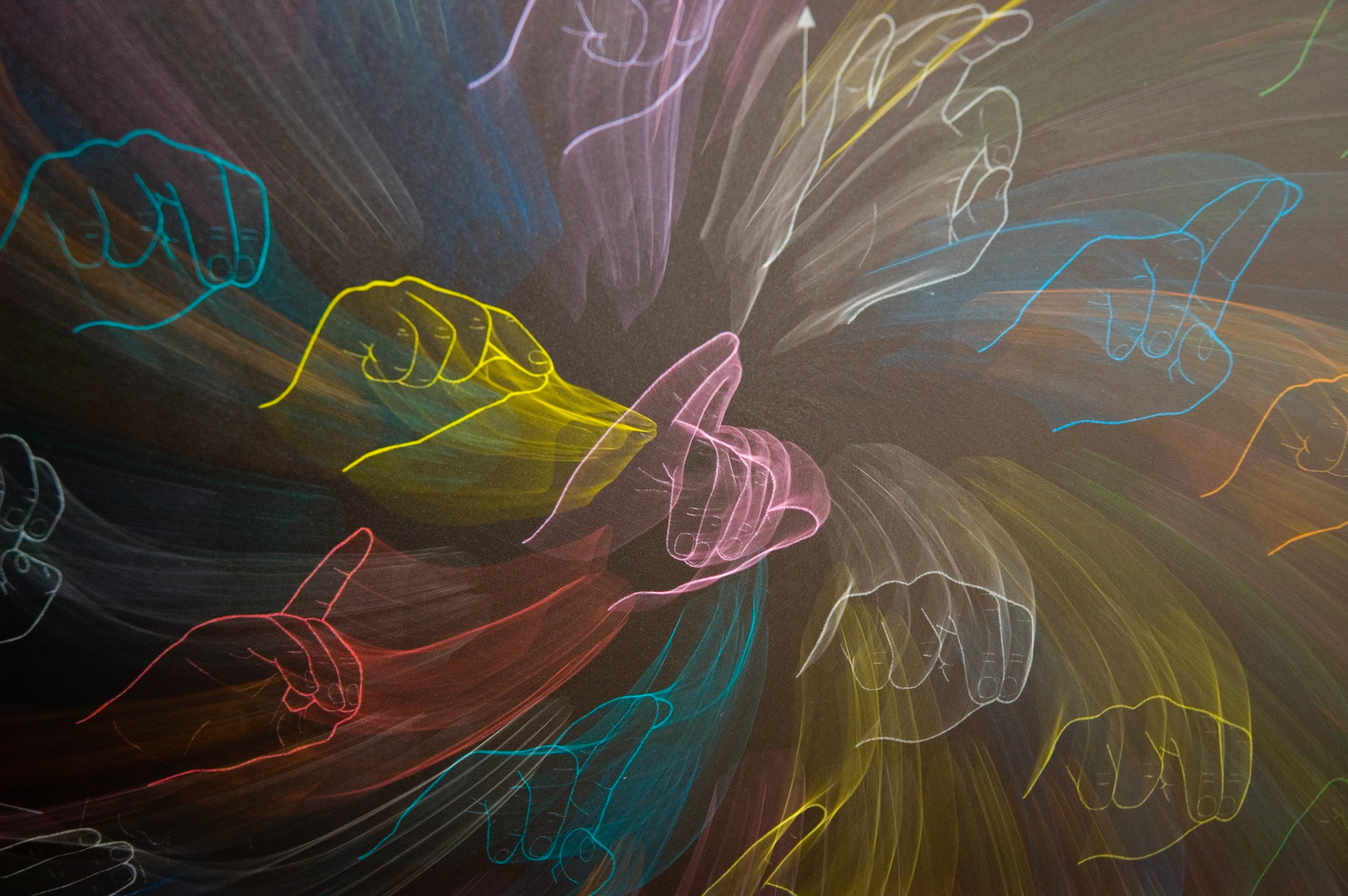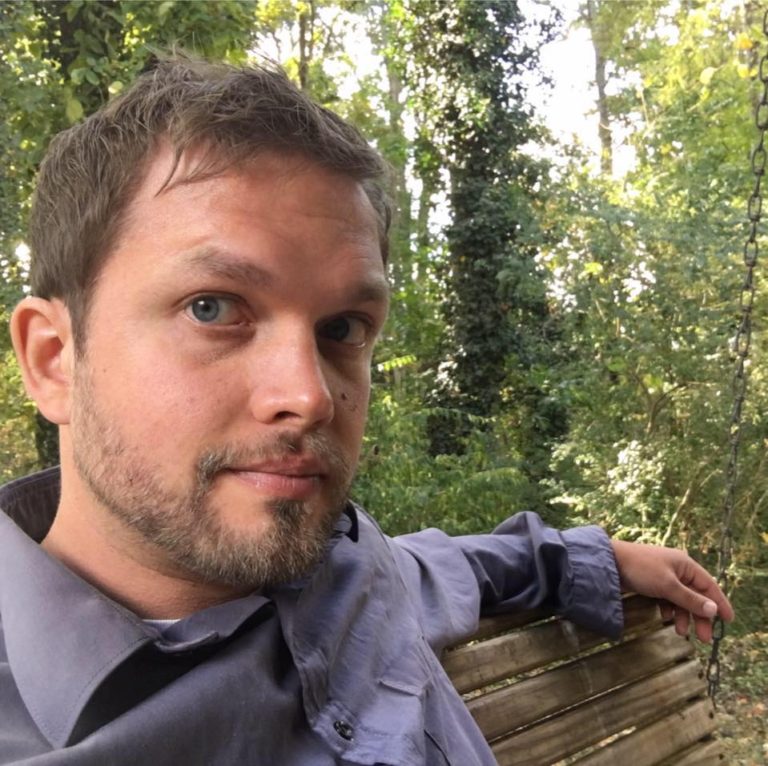When I was a middle school kid in the early stages of going deaf, I didn’t understand all of the cultural baggage and philosophical context associated with disability the way I do now. What I did understand was the way that my peers (including my crush) looked at me when I came in with behind-the-ear hearing aids at the start of 7th grade. I wasn’t then deaf enough to not hear the giggling and gossiping in lines behind me. In the years that followed, I would make my way through school and sports, pursue my dream of being a teacher, a theatre director, a family man. And everything I did was harder because I was disabled than it otherwise would have been. At any point during my life, if I could have gotten rid of my disability, I would do so in a heartbeat. Can you blame me?
Fast forward to today and I am – in a very literal sense – a cyborg. My natural hearing is basically gone, and I am held into my life as part of the hearing community through a high tech cochlear implant. I can’t tell you how thankful I am for this technology. Even so, I am reminded of how fragile this connection is. Every time my batteries die in the middle of an important event, every time my equipment gets damaged and I am suddenly deaf and unskilled for days while I wait anxiously for mail with replacement parts to come, I am forced to confront the reality of my deafness. My assistive technology helps bridge the gap between me (a deaf person) and the world I ostensibly belong to (the hearing world); when it fails, there’s no sugar coating that I am very disabled.
In recent years, the social model of disability has really begun to gain new ground. This is in no small part due to the influence of UD in system design and UDL in education. More and more, I am hearing the catch phrase, “it isn’t people who are disabled, it’s environments that are disabling.” I’ve used this point myself in workshops.
Consider, for example, a 5th grade girl, Brianna, who is deaf and fluent in American Sign Language (ASL). If we put her in a classroom in which spoken English is the primary channel of communication, she is reliant on translators and is certainly disabled. If Brianna were to be in a classroom in which ASL were the primary channel of communication, she is no longer disabled in that setting. On the contrary, a hearing peer who does not speak ASL would be the one who is disabled and in need of accommodation!
And I believe this. I think it is absolutely true that the vast majority of our systems and environments are designed for a so-called normal range of people, and thus those of us who fall outside of that range due to our variable characteristics (physical, neurological, emotional, social) are excluded. I believe this is empowering for us as system and educational designers.
But I’ve also found myself uncomfortable with the rhetoric of “disabling systems, not disabled people” for reasons I struggled to put into words until recently. In Joni Denger’s blog entry, she does a good job underscoring some of this. She shared an anecdote about not being able to hear an alarm and how this seemingly simple problem almost led to serious social and professional damage. It’s true that hotels could begin making alarms with pillow shaking or light flashing a staple option (that would be so nice!). Even then, people like Joni and me are dependent on hotels to provide such things, we are dependent on their functioning, we are still unequivocally, people whose hearing is not fully functional in a world in which hearing is part of the human experience for most.
There’s something those of us who rely on assistive technology (like hearing aids, cochlear implants, prosthetics, wheelchairs or braille readers) wish others knew. It’s really stressful to put major parts of our lives in the fragile hands of technology. I know I live with a quiet stress every day, all day, thinking about humidity, making sure I have spare batteries, worried about it when one of my kids accidentally knocks my processor off (Is it damaged? Did the cable snap?). These aren’t irrational fears. I’ve suddenly and completely lost hearing to failed technology on vacations, at conferences, in the middle of teaching classes. In those moments, a core aspect of how I function is lost.
Other times, it isn’t a failure of my technology but limitation. In noisy places where some of my favorite social and professional activity happens (the coffee bar, the after 5 o’clock kind of bar…) I can’t hear or can’t hear well. I struggle to keep up with conversations. And in those frequent times, I know I appear unintelligent. I ask questions that have been answered. I nod along sheepishly with a confused look on my face. I say things someone else recently said. I ask for repetitions more times than people have patience to give. And feeling like others think I’m unintelligent really hurts, if I can be honest.
As we change environments to be more inclusive, we are taking a big step in the right direction. Not just for people with disabilities, but often we are major beneficiaries. I think environments have a major role in exacerbating or activating the disabling aspect of disabilities. But just as we’ve rightly moved away from the rhetoric of “colorblindness” when it comes to races and people of color, I think we need to be intentional about not erasing the “disabled” part of people with disabilities. There’s some danger in thinking that changing environments erases disability. Inevitably, when we leave inclusive environments, when we disconnect from our assistive technology and mobility devices, when we find ourselves in hotels unequipped for people like us or in classrooms in which children don’t yet understand how cruel their words can be… we are, under all the best efforts, still disabled.
I am totally on board for addressing the ways that environments exacerbate and deepen the disabling aspects of disabilities. But maybe we can at the same time embrace the disabled person who remains.
Dr. Eric Moore
Dr. Eric Moore is the Universal Design for Learning & Accessibility Specialist + Instructional Designer at the University of Tennessee as well as a practicing educational consultant and author of UDL Navigators in Higher Education: A Field Guide. Contact him directly at DREJMOORE@INNOSPIRE.ORG



